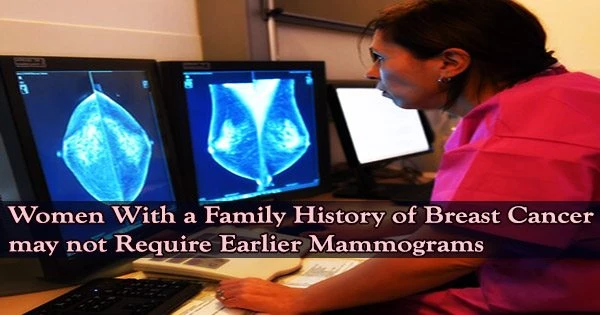According to a recent study published in the American Cancer Society journal Cancer, women who have a mother, sister, or daughter who has been diagnosed with breast cancer should start mammography screening earlier than recommended.
Women who are otherwise at ordinary risk who have a first-degree family member with breast cancer are frequently encouraged to start getting screened 10 years earlier than the relative’s age of diagnosis. However, the well-established advice is not well-supported by the available data.
UC Davis Comprehensive Cancer Center researcher Diana Miglioretti joined Danielle Durham, with the Department of Radiology at the University of North Carolina at Chapel Hill, and five other researchers on the study.
To determine when screenings for women with a family history of breast cancer should start, researchers looked at data from the Breast Cancer Surveillance Consortium on screening mammography performed between 1996 and 2016.
The study concluded that a woman with a relative diagnosed at or before age 45 may wish to consider, in consultation with her doctor, initiating screening 5-8 years earlier than their relative’s diagnosis age, rather than a decade earlier. That puts them at a risk that is equal to that of an average-risk woman who is age 50, which is the most recommended age for starting mammograms.
Dr. Danielle Durham
More than 300,000 women were included in the national study. According to the relative’s age at diagnosis and screening age, researchers examined the cumulative 5-year breast cancer incidence among women with and without a first-degree family history of the disease.
“The study concluded that a woman with a relative diagnosed at or before age 45 may wish to consider, in consultation with her doctor, initiating screening 5-8 years earlier than their relative’s diagnosis age, rather than a decade earlier. That puts them at a risk that is equal to that of an average-risk woman who is age 50, which is the most recommended age for starting mammograms,” said Durham.
BRCA gene mutation carriers may benefit from starting screenings earlier. Consider genetic counseling if you are a 30-39-year-old woman with more than one first-degree relative who has been diagnosed with breast cancer.
The possible risks of commencing breast cancer screenings too early might be decreased by raising the starting age. Increased radiation exposure and false positive tests that send women back to the clinic for imaging tests and sometimes invasive treatments but don’t reveal breast cancer are two examples of these. The earlier a woman starts receiving mammograms, the more screenings they will undergo over their lifetime and that increases the chances of experiencing these harms.
“Mammography also may not perform as well in younger women because they are more likely to have dense breasts which increase the difficulty of finding cancer on the images and results in more false positives,” Miglioretti said.
The other authors on this study include Linn A. Abraham, Kaiser Permanente Washington Health Research Institute; Megan C. Roberts, UNC Eshelman School of Pharmacy; Carly P. Khan, Patient-Centered Outcomes Research Institute; Robert A. Smith, American Cancer Society, and Karla Kerlikowske, UCSF Health. Miglioretti is an affiliate investigator with UC Davis Center for Healthcare Policy and Research and Kaiser Permanente Washington Health Research.
The study was supported through funding by the Cancer Prevention Fellowship Program, the Division of Cancer Prevention, and the National Cancer Institute (NCI) at the National Institutes of Health. Data collection by the Breast Cancer Surveillance Consortium was funded by the NCI (grant numbers P01CA154292, U54CA163303, and PCS-1504-30370).





